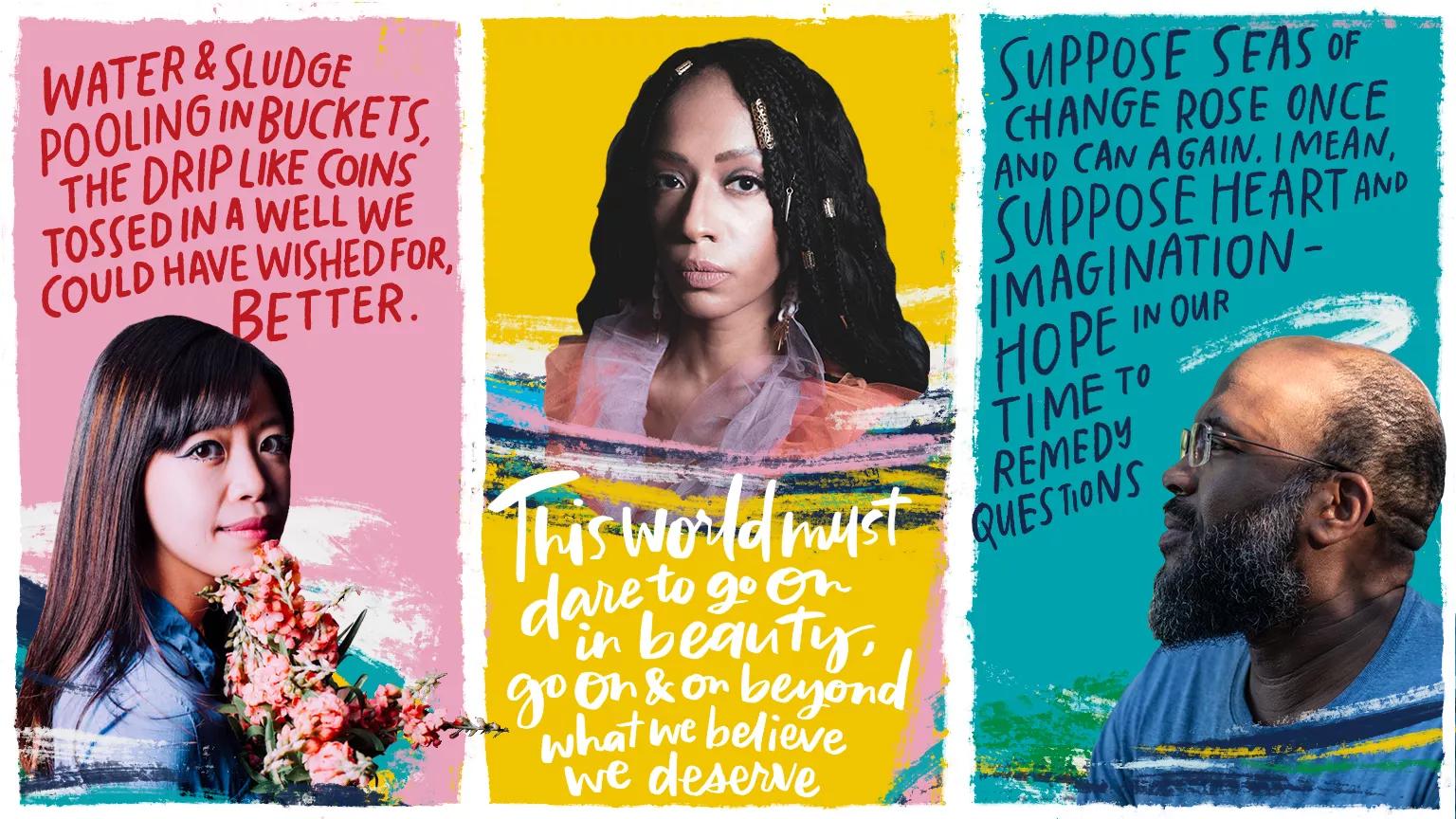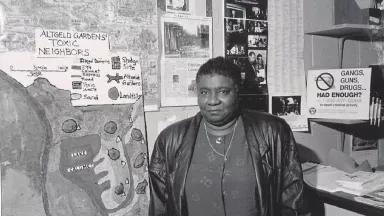Poets Imagine a Different Climate Narrative
Three writers counter despair and summon courage in facing the challenges of our warming world.

Illustration by Angela Southern for NRDC (Photos, from left: Courtesy of Jane Wong; Courtesy of Rachel Eliza Griffiths; Geoff Wyatt)
In celebration of National Poetry Month and Earth Month this April, NRDC has partnered with Orion Magazine to ask three poets to face our climate crisis head-on and “Imagine If.”
Imagine if—climate solutions were rooted in justice, empowerment, and abundance.
Imagine if—our air, water, and land were protected in the same way that profits are.
Imagine if—we chose a more courageous path forward.
As poet Rachel Eliza Griffiths says of her piece: “The question, inside the poem's shape, is about the ways that love can drown or rescue us from ourselves, and how, with better and more radical imaginations, we might extend the earth and natural world the very kind of goodness and awareness we want and need so deeply for ourselves."
Such radical imagination is actually central to addressing climate change. Through their art, each writer honors the balance between recognizing the harsh realities of a warming planet and summoning the courage to face the work ahead.
By Courtney Lindwall
Jane Wong
(Washington)
Wong is the author of the poetry collections How to Not Be Afraid of Everything and Overpour, and her work regularly appears in publications like American Poetry Review, Best American Poetry, and the Kenyon Review. Wong is the recipient of a Pushcart Prize and Kundiman fellowship for Asian American poetry. She is currently an associate professor of creative writing at Western Washington University. Her memoir, Meet Me Tonight in Atlantic City, is out this May.
Weather Report
My brother’s roof is leaking.
Hurricane Ida ruptured open
the top like scoring good bread. Water &
sludge pooling in buckets, the drip
like coins tossed in a well we could have
wished for, better. My mother
still drove to night shift, even though I
told her not to. You can’t take a day
off for a freaking hurricane? The romas
in her garden are tangled, sweet
lanterns in waterlogged mutiny.
They are thriving, still. I am
on the phone, asking her about vegetables,
like when to plant & how to
make fertilizer from curls of shrimp shells
but then I remember we live
in different growing zones. Here, there’s
a cold snap, puff of ghostly blue
breath. My tomatoes are still
stupidly green. I keep touching
them like I could warm them red.
Maybe I could tuck them in
my armpits, my tender wings.
They cling to the vine, a reminder
there’s still time, yet. Across the country,
my brother sends me memes
of kittens & alpacas & I
heart them all. Tiny everythings
living, softening such hard air with
fur & furious hope—even as
his buckets keep filling and filling.
Rachel Eliza Griffiths
(New York)
Griffiths is a poet, novelist, and photographer whose work can be found in the Best American Poetry, New Yorker, and Paris Review, among numerous other publications. She’s the author of five collections of poetry, including her most recent of poetry and photography, Seeing the Body. In 2014, she created P.O.P (Poets on Poetry), a video project that features an intimate series of interviews with more than 100 contemporary poets. Griffiths’s debut novel, Promise, will be published by Random House.
Before, Again
There are endless waves that grant the dreams
That lived once, green & wild, in the blood of
Our intimate invention. We try to name what
Is already full, complete, & endless. Dear earth,
I want to circle you the way memory lives inside
Of endangered creatures. I want to remember
How we all belong to the water & her shapeless
Heart. We say love is a single breath, a life
That spans the wounds of our bones. We can’t
Ask the banyan tree to trust our hands, the wars
& feasts we have made from fear. I want to hold
My head close to the wind, each thought shivering
Like the bee inside the crown of her hive, gold cells
Dripping with the tides that hum & crawl with wings.
Heart in the wind, spinning like a star or dust––we
Roar in the power we believe we have made. This
World must dare to go on in beauty, go on & on
Beyond what we believe we deserve. Dear earth,
Love is You. Ordinary splendor splashing the shores
Of our errors, the simple declaration of a breath
That lives, green & wildly, inside of memory & her
Kingdom. Look, wing, look, claw & teeth, look & please
Remember the ferns & mushrooms, the bend of any
Creature drinking water in thirst. Wait, until you see
The howl of birds & the grin of elephants or even
Mosquitoes as they move, nameless in abundant
Families. Do you remember what was meant of us?
My mother’s hands picking seeds from lemons
Before she cleaned a good fish. What hunger
She shared while I watched, nearly crying
With pleasure. The mercy of each wave
Pulling me awake. I deserve this wonder &
The long sun, splayed against hours & how
The sky shone just before the downpour
Of rain in this dream.
Sean Hill
(Montana)
A Georgia native, Hill is the author of two poetry collections, Dangerous Goods and Blood Ties & Brown Liquor, the latter of which was listed as one of the 10 books all Georgians should read in 2015 by the Georgia Center for the Book. Hill’s work has appeared everywhere, from Tin House to the Harvard Review to Orion Magazine, and he’s received numerous awards, including fellowships from the MacDowell Colony and the National Endowment for the Arts. Hill currently lives in Montana and teaches creative writing at the University of Montana.
Imagine We’re Ancestors Dreaming
And suppose the seas rose; what if megafires,
I mean, what if blossoms come too early, blooming
before the last frost, so starvation’s looming for
the bees looking for petals to slide between.
Suppose a hundred-year drought for our loves
and bomb cyclones and hurricanes for what’s
held in a palm and most all our conveniences
—our modern balms or what we take to be
necessities, things assuming roles as central
as the heart and our beloveds as we lean away
from our relations with human and nonhuman
beings, ones that if tended could blossom. Too
early blooming drives famished bears to scavenge
alleys for trash alms before they can retire to dens
under fur and fat blankets, warm. Imagine massacres
or holding folks as property, presuming a narrow
definition of worthy relations to screen others out
—the point of who is kin drawn keen. Suppose seas
of change rose once and can again, I mean, suppose
heart and imagination—hope in our time to remedy
questions or statements as dooming as what if
blossoms come too early, blooming? Suppose
a hundred-year drought for our loves and balms.
This NRDC.org story is available for online republication by news media outlets or nonprofits under these conditions: The writer(s) must be credited with a byline; you must note prominently that the story was originally published by NRDC.org and link to the original; the story cannot be edited (beyond simple things such as grammar); you can’t resell the story in any form or grant republishing rights to other outlets; you can’t republish our material wholesale or automatically—you need to select stories individually; you can’t republish the photos or graphics on our site without specific permission; you should drop us a note to let us know when you’ve used one of our stories.




IPCC: We Cannot Look Away—Climate Risks Are Cascading
In Nighttime Shots of Massive Wildfires, a Photographer Shows Us the Light
How to Protect Your Property—and Our Planet—from Harmful Wildfire